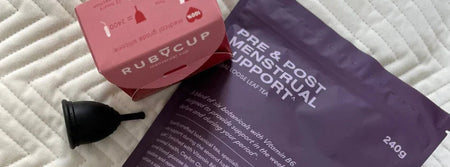Quick answer: Low chance, but not impossible.
Because sperm can survive in the reproductive tract for up to 5 days, intercourse during menstruation, especially toward the end of your period, can sometimes lead to fertilization if ovulation occurs soon after. The probability is low compared to other days in your cycle, but it’s never zero.
In this article, we’ve summarized the latest scientific research on how and when pregnancy can happen during menstruation, so you can understand the real numbers behind the risks.
Why it’s unlikely but still possible to get pregnant on your period
Research shows that most pregnancies happen when intercourse occurs during a six-day fertile window that ends on the day of ovulation. The chance of conceiving ranges from about 10% if sex happens five days before ovulation, to 33% on the day of ovulation which usually falls in the middle of your cycle.
Since menstruation usually happens at the very start of the cycle (days 1–5), it generally falls outside this fertile window, making pregnancy during your period unlikely. In fact, the chance of being fertile on day 2 of your cycle is less than 1% and the possibility of a fertile window on day 4 is about 2%.
However, fertility isn’t always perfectly predictable. Women with shorter cycles (21–24 days) or irregular cycles may ovulate earlier than expected. In these cases, intercourse toward the end of your period could be closer to ovulation, slightly increasing the chance of pregnancy.

Can you be pregnant and still have a period?
So you’ve got your period, and you’re enjoying some me-time in your period panties, happy days. But does this mean that you definitely have not fallen pregnant? While it is uncommon, it might surprise you to know that it is actually possible for some individuals to experience bleeding that resembles a menstrual period during pregnancy.
This is often referred to as "implantation bleeding", which occurs when a fertilised egg implants itself into the lining of the uterus, typically around 6-12 days after conception.
-
How common? About 1 in 4 pregnant people may see light bleeding when an embryo implants in the uterine wall. Also, some studies of very early pregnancy report that 9% of women had at least one day of vaginal bleeding in the first 8 weeks.
-
When does it happen? Usually 1 to 2 weeks after fertilization, which can overlap with when you might expect your next period.
- What does it look like? It is usually much lighter and shorter in comparison to a typical menstrual period. It may appear as light spotting or a pinkish/brown discharge, rather than the red flow of a period.
Of course, it goes without saying that any vaginal bleeding during pregnancy should be promptly evaluated by a healthcare provider, just to be safe.
Are there any benefits to having sex on your period?
Yes, the answer is that there are actually lots of benefits surrounding period sex that you might not have considered:
-
Pain relief: Having an orgasm can trigger the release of endorphins into the bloodstream which are natural pain-relieving hormones. This can be a great help in relieving headaches, menstrual cramps and pelvic discomfort that lots of women experience around their menstrual cycle.
-
Improved mood: Endorphins also help ease irritability and stress.
-
Natural lubrication: Period blood acts as a natural lubricant which will enhance comfort and reduce friction for a more enjoyable experience for both partners
-
Increased sensitivity: Higher blood flow enhances sexual pleasure and satisfaction.
Just remember: communication, consent, and protection are key, even during your period.
Written By Valentina Carrara
Valentina has been part of the Ruby Cup team for many years and is our go-to expert on menstrual cups. With plenty of knowledge and experience, she’s passionate about helping people understand how menstrual cups work (Ruby Cup is her favourite period product after all!) and why they’re a great option. If you have any questions or doubts, she’s always happy to help: Just drop her a message at hello@rubycup.com.










